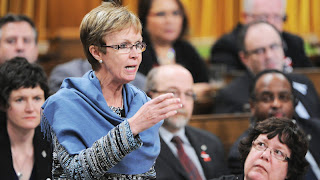I told myself again and again that I wouldn't do this, but with what's been happening lately, I can no longer resist! And let me be honest with those who'll read this, I'm not trying to pick someone to be the next leader of the Liberal Party; instead I'm just expressing who I think most certainly shouldn't be.
I'll just let that comprehensive article speak for itself, and may you formulate your own opinion.
But, seeing as we're already here, I may as well tell you mine.
The problem with what is happening right now on the national stage regarding the Liberal Party is that many people see the last name "Trudeau" and they go into a frenzy of sorts. They automatically harken back to the days of yore when a Mister Pierre Elliott Trudeau was Prime Minister of this great country, leading us though one crises after another, all the while spearheading initiatives that even Canadians at the time didn't know were necessary. I will wholeheartedly admit that he was a visionary, and the major things he accomplished while in office make up the bulk what of Canadians are proud of today when we compare ourselves to other countries.
Be that as it may, and now that its said: his son is most certainly NOT of the same calibre.
Just because his last name is Trudeau doesn't mean for one second that he should be exempt from the same scrutiny Canadians unleash upon a new leadership candidate. And when one does look at Mr. Trudeau's track record, ambitions and vision, well...its frightening.
My biggest concern, and the one thing that should concern most Canadians, is the fear that the Liberal Party of Canada will not hold a leadership convention, but rather a leadership coronation. The Trudeau name may rings the bells of "royalty" (dare I say the word!) in the ears of the supporters of our dear centrist party, but Canadians as a people should be aware of the dangers present in that sort of goings on.
Mr. Trudeau, and this is in my own humble opinion, simply does not have the character, vision, ability and unifying charisma to be successful as the next Liberal leader. All one must do is look at his opinions about Quebec's future in Canada and his shocking anti-Alberta viewpoint to get a true sense of what his plans would be if he were to become the leader of the Liberal Party, and/or much worse, a future Prime Minister.
All Justin Trudeau will serve to accomplish is to bring back the old and (mostly) buried problems that plagued this nation when his father was in power. The Francophone versus Anglophone dynamic is not something to be resurrected. His father was incredibly popular among all Canadians because he was a unifying, federalist force that hailed from the one province that needed that kind of influence, Quebec. Almost thirty years later, the game has changed: Canada's provinces can longer afford to bicker amongst themselves; we must stand together as one to face the global challenges that await on us on the international stage. Failure to do so could certainly be catastrophic.
Thus, knowing Mr. Trudeau's opinions toward Canadian unity and the position of Quebec in the federation; as well as his views on the one province that has never been fertile ground for his party; one can safely assume that Justin Trudeau at the helm of the Liberal Party's resurrection from obscurity will spell nothing but uncertainty for Canada as a whole.
Do we, as Canadians, really want to take the chance? The Liberal Party will not likely stay a rump third-place mess for long, so let us make sure that the next person to lead it won't be someone who'll drive another wedge between our provinces, and ultimately threaten the stability of our nation.
What DO YOU THINK? Let me know in the comments section below!







